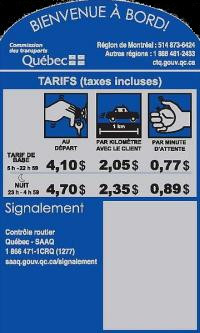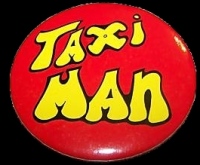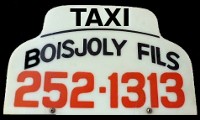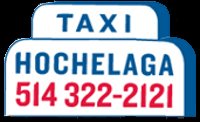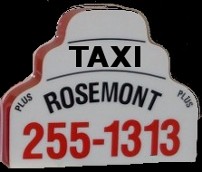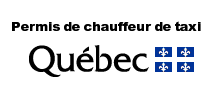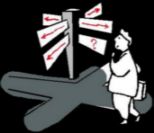New York taxi drivers split over GPS technology, possible strike
August 2007 02:25PM
New York City taxi drivers are split on whether they should strike in opposition to a new GPS requirement.
One taxi group plans to strike from 5 a.m., Sept. 5, through 5 a.m., Sept. 7, in opposition to New York City's requirement that all cabs be equipped with GPS technology beginning Oct. 1. The New York Taxi Workers Alliance, which claims more than 8,400 members, announced the strike dates this week, saying GPS infringes on drivers' privacy.
The New York State Federation of Taxi Drivers and other groups representing about 10,000 cab drivers oppose the strike.
The Taxi and Limousine Commission passed a rule stating that all New York City cabs must have touch-screen display panels, credit card readers, and GPS beginning this year. Many taxis already are equipped with the technologies, which allow passengers to get news, route data, and other information.
The TLC claims that the technology will not be used to invade drivers' privacy but will provide real-time maps and help passengers recover lost property.
The TLC said it would use electronic trip reports to assess the needs of the industry, which it does now with paper trip sheets. New York City's contracts prohibit vendors from sharing information regarding off-duty locations of taxicabs with the TLC. The technology is also designed to notify drivers of emergencies. Passengers can turn the monitors off after mandatory safety information has been displayed.
The TLC says all cabs should accept credit cards because people generally tip more when paying with credit cards and pedestrians are more likely to hail cabs if they can pay with plastic. Tests showed that the credit card processing times are normally less than eight seconds.
"These systems were designed with taxi rider and taxi driver input to enrich the passenger experience, something the industry promised three years ago when it accepted a 26 percent fare increase," TLC Chairman Matthew Daus said in a statement. "While most of the industry is honoring that promise -- 73 percent have already chosen a system before the due date -- I am puzzled that this group is not telling its members that drivers with the systems are making significantly more money in tips!"
New York State Federation of Taxi Drivers Spokesman Fernando Mateo agrees, and said that service will not be interrupted.
"Our member drivers that have installed GPS get better tips, drive longer rides, and get places more efficiently," he said in a statement. "It is unfortunate that some believe that providing better service to the public is a disadvantage, and we do not agree."
Joseph Sanscrainte, an expert in consumer protection and privacy issues and an associate in the New York office of Bryan Cave, doesn't think the GPS requirement is a privacy violation.
"Consent to the GPS system is implied by the fact that medallion owners have consented to partake in the highly regulated NYC taxi industry," Sanscrainte said in a statement. "The fact that the industry is so highly regulated means that the medallion owners have a reduced expectation of privacy."
New York City taxi drivers are split on whether they should strike in opposition to a new GPS requirement.
One taxi group plans to strike from 5 a.m., Sept. 5, through 5 a.m., Sept. 7, in opposition to New York City's requirement that all cabs be equipped with GPS technology beginning Oct. 1. The New York Taxi Workers Alliance, which claims more than 8,400 members, announced the strike dates this week, saying GPS infringes on drivers' privacy.
The New York State Federation of Taxi Drivers and other groups representing about 10,000 cab drivers oppose the strike.
The Taxi and Limousine Commission passed a rule stating that all New York City cabs must have touch-screen display panels, credit card readers, and GPS beginning this year. Many taxis already are equipped with the technologies, which allow passengers to get news, route data, and other information.
The TLC claims that the technology will not be used to invade drivers' privacy but will provide real-time maps and help passengers recover lost property.
The TLC said it would use electronic trip reports to assess the needs of the industry, which it does now with paper trip sheets. New York City's contracts prohibit vendors from sharing information regarding off-duty locations of taxicabs with the TLC. The technology is also designed to notify drivers of emergencies. Passengers can turn the monitors off after mandatory safety information has been displayed.
The TLC says all cabs should accept credit cards because people generally tip more when paying with credit cards and pedestrians are more likely to hail cabs if they can pay with plastic. Tests showed that the credit card processing times are normally less than eight seconds.
"These systems were designed with taxi rider and taxi driver input to enrich the passenger experience, something the industry promised three years ago when it accepted a 26 percent fare increase," TLC Chairman Matthew Daus said in a statement. "While most of the industry is honoring that promise -- 73 percent have already chosen a system before the due date -- I am puzzled that this group is not telling its members that drivers with the systems are making significantly more money in tips!"
New York State Federation of Taxi Drivers Spokesman Fernando Mateo agrees, and said that service will not be interrupted.
"Our member drivers that have installed GPS get better tips, drive longer rides, and get places more efficiently," he said in a statement. "It is unfortunate that some believe that providing better service to the public is a disadvantage, and we do not agree."
Joseph Sanscrainte, an expert in consumer protection and privacy issues and an associate in the New York office of Bryan Cave, doesn't think the GPS requirement is a privacy violation.
"Consent to the GPS system is implied by the fact that medallion owners have consented to partake in the highly regulated NYC taxi industry," Sanscrainte said in a statement. "The fact that the industry is so highly regulated means that the medallion owners have a reduced expectation of privacy."
Libellés : GPS


